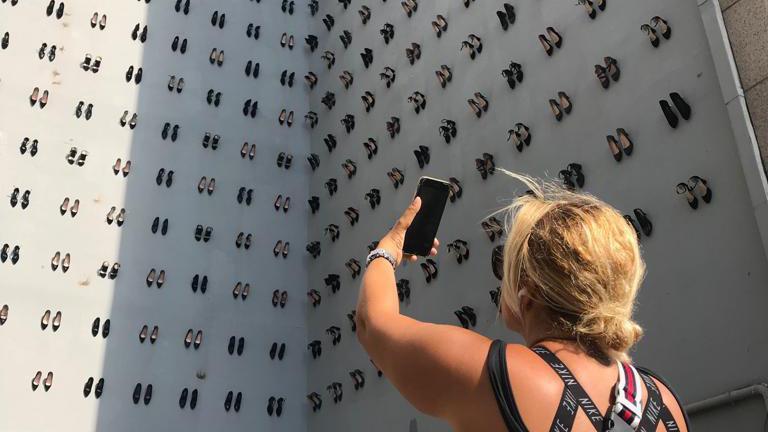
Some 440 pairs of women’s shoes have been hung on two art installation walls in Istanbul’s Kabataş neighborhood in the Beyoğlu district in an attempt to raise awareness on women killed by domestic violence.
The artist Vahit Tuna’s work is exhibited in open air as part of the Yanköşe, the not-for-profit art platform realized in 2017 by Kahve Dünyası, a large coffee chain in Turkey.
“We wanted everyone passing by the road to see [the work]. This is why we did not want to host the exhibition in a closed area,” Tuna was quoted as saying by Turkish media.
One of the very few public art projects in Turkey, Yanköşe reaches thousands of people every day because of its location in the city.
Spread across an area of approximately 260 square meters on the outer wall and the intersecting wall of the Kahve Dünyası branch in Kabataş, at number 85 on Meclis-i Mebusan Street, Yanköşe opens up a space of expression for artists who produce experimental contemporary art works.
Yanköşe also stands out for the fact that the exhibited works are temporary and do not have a commercial motive.
“Here is Yanköşe project. One artist each year uses these two walls to exhibit their art works. And this time, I wanted to exhibit a work here. This is an installation project that consists of shoes. There are 440 pairs of shoes here. These 440 women shoes are equal to the number of women killed in 2018 in Turkey,” Tuna said.
“What this project does is that it both raises awareness regarding women murders and also materializes this issue like a sculpture or monument. This work will stay here for six months,” he noted.
Some 440 women were killed in Turkey in 2018, according to Kadın Cinayetlerini Durduracağız Platformu (We Will Stop Femicide Platform) – an organization that keeps a tally of femicides across the country.
The number of women killed in 2017 was 409, according to a previous report published by the same organization.